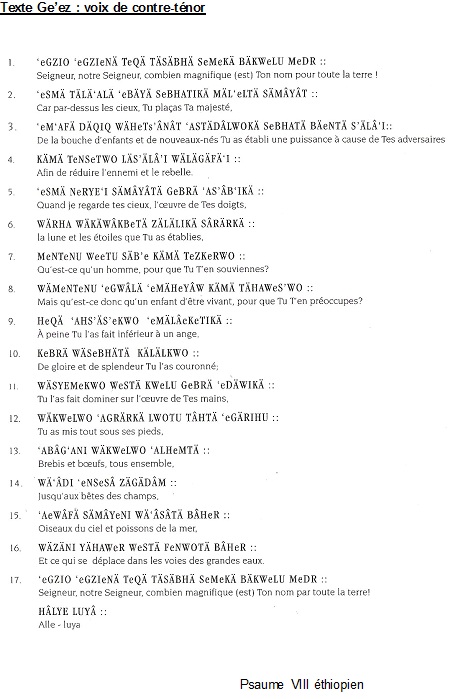Cri de silence, in memoriam JLF (Shout of silence)
(Calls – Dance – Lamentation)
5 voices (Countertenor, 2 tenors, baritone, bass) and positive organ
Texts in hebrew, arabic, latin, ge’ez, malagasy and french
(2011)
Duration : 11’
Commissioned by la Péniche-Opéra
First performance on may 16th 2011 by Ensemble Clément Janequin conducted by Dominique Visse
“Calls” :
“Dance” :
“Lamentation” :
To get the score, send an email to the association Alcmène : Contact
When Dominique Visse asked me to write a “Lament” to be played alongside the work of Josquin des Près in a programme of the Janequin ensemble entitled “The Cries of Death”, I immediately decided to dedicate it to the composer Jean-Louis Florentz.
Jean-Louis Florentz passed away on the day of the first performance of my own Requiem in July 2004 when I promised myself to write a piece in his memory. A true homage requires the strongly underlying presence of he to whom tribute is being paid so I could only tackle this work by letting Florentz’s universe penetrate mine; a very personal universe, founded on an impressive erudition (science, history, religion, geography, linguistics …) and an extremely speculative musical output with complex modal technique which serves to fuel not only bird song sonagrams but also the sound spectrum of a Boeing jet. The educated advice of Michel Bourcier, a great specialist and superb performer of Jean-Louis Florentz’s music, enabled me to take up this great challenge.
My first idea was to assign a different language to each of the five voices: the Requiem in Latin, considering the circumstances and the link with Josquin: French because I wanted Florent’s words to be heard with a text from his collection; Arabic and Hebrew because the Holy Scriptures were the fundamental pillars of his thoughts; Madagascan because he held a great affection for Madagascar and in particular the poet Jean-Joseph Rabearivelo whose suicide in 1937 became emblematic of the partition of cultures – such a dear theme for the composer; it would be unimaginable also not to include the Ge’ez, this ancient Ethiopian language that the composer knew so well and which he had used in his work “Asmara”. Six languages for five voices! This linguistical excess, far from being a setback became the catalyst for the musical composition and gave me the best idea to honour the memory of this idealistic humanist with ecumenical ambition.
The five ancestral and poetic voices were to open the work with a succession of appeals across the centuries: an extract from “Samuel” in Hebrew, Introit and Lux aeterna from the death Mass in Latin; an extract from two suras of the Koran in Arabic, the 8th Psalm in Ge’ez, then “The New Tomb” by Rabearivelo in Madagascan; these languages would be superposed in a counterpoint sustained by the dance rhythm of the organ, before eventually merging together, one after the other into the French text: the voice of Jean-Louis Florentz resounding over the unchanging harmony of a long lament.
Each composer has his own speculative ground, his own combinations, his own construction devices, etc. For this work, I tried to get to grips with Florentz’s techniques, his modal and digital combinations: for example the rhythmical content based on the transcript in morse code of the names of seven archangels in the Book of Enoch to match the order of the number of the Ge’ez syllables. I was anxious to respect the authenticity of the source melodies: the text from Samuel is written on a Jewish chant, the Requiem on a Gregorian plainchant, the Sura on a Sheik’s recitation, the 8th Psalm on an extract of a lithurgical Ethiopian chant, Rabearivelo’s poem on a traditional Madagascan air; the actual task here in the contrapuntal work here was to reconcile such very different sources.
And of course the numerous quotations, without which there wouldn’t be a true homage, but always very stylised and in keeping with the narrative.
The accumulation of restrictions often made the problems impossible to solve and it is not without suffering that this “Shout of silence” gradually took shape. But without a doubt, it was the only way of paying just tribute to the memory of this meticulous composer. He was obsessively anxious to justify in rational manner all the elements making up his work, yet he was always driven by an irrational, irrepressible force.
Patrick Burgan
Witl all my gratitude to Miss Ezaka Rakotomamandjana (Malagasy), Saïd Benjelloun (Arabic) and Zeev Maoz (Hebrew), for precious help.
TEXTS

Malagasy text : tenor 1
FASANA FAHAROA
Ilay fasako, fasana ihany,
Fa ny foko dia fasana koa !
Io no fasako ivelan’ny tany,
Io no fasako iray, faharoa !
Tsy mba vero na mba rangolahy,
No mandrakotra an’io fasana io
Fa ny nofoko zary manahy
No mandrakotra omaly sy anio.
Sentosento no mamelovelo,
Ranomaso, toloko tsy tana
Izy ireny no sarin’avelo
Mitampody ka sarotra ialana
Ao ny nofy novolavolaina,
Izay nisinda nalaky, tsy hita !
Ao no rendrika ilay nantenaina,
Ilay sambo natao ho tafita !
Ao ny tsantan’ny andro taloha
Izay nivimbina fanantenako
No hilefitra ka tsy hifoha,
Ka hiverina hitondra ako !
Ao ny zava-drehetra voakasa,
Saingy simba, ka very tadidy !
Ao ny taolan’ny androko lasa,
Sy ny ora tsy masi-mandidy !
Ao ny nofo nikipaka mora,
Ao ny maty daholo daholo !
Ao malazo na mbola tanora,
Ka mianjera tsy mana-mpisolo !
THE NEW GRAVE (french translation)
Ma tombe est toujours ma tombe,
mais mon cœur en est une autre
C’est ma tombe en dehors de la terre;
c’est ma seconde tombe.
Ce ne sont pas des herbes qui la cachent,
ni non plus une pierre-mâle
C’est ma chair pleine de soucis
qui la dissimule.
Mes vibrants soupirs, mes larmes
et mes sanglots incontenus
y jouent les revenants
et me hantent sans cesse.
Là sont les rêves conçus,
mais qui s’étaient dissipés brusquement
et invisiblement. Là sont les épaves
du bateau de l’Espérance.
Là les stances du Passé,
et chants de ma Jeunesse
sont ensevelis et ne se réveillent plus
Pas même pour donner un écho!
Là sont tous les projets
perdus et oubliés.
Là gisent les os de mes jours lointains
et de mes heures sans pouvoirs.
Là se décompose lentement la chair.
Là elle flétrit
et tombe quoique jeune.
Là sont les morts – tous les morts.
J. J. RABEARIVELO
Arabic text : tenor 2
6. Sourate des Bestiaux (Al-An‘âm)
35. Wa in k?na kabura aalaïka iaar??uhum
Fa inista?aata an tabtaghiya nafaghan fi al-ar?i
aw sullaman fi s-sam?’I fa ta’tiyahum bi ?yatin
wa law ch?’Al-l?hu la jama-aahum aala al-hud?
fa l? tak?nanna mina al-j?hil?n(a)
[35] L’indifférence des négateurs te pèse tellement que, si tu pouvais, tu creuserais une galerie dans le sol ou tu dresserais une échelle vers le ciel pour leur en rapporter un miracle ! Or, si Dieu l’avait voulu, Il les aurait tous réunis et guidés dans la bonne voie. Ne sois donc pas du nombre des ignorants !
89. Sourate de l’Aube (Al-Fajr)
27. Y? aïyatuha n-nafsu al-mu?ma’innatu
28. Irjiè? il? rabbiki r??iyyatan mar?iyyatan
29. Fa dkhul? f? aïb?d?
30. Wa dkhul? jannat?
27] Quant à toi, ô âme, désormais apaisée ! [28] Retourne auprès de ton Seigneur, satisfaite et agréée ! [29] Sois désormais du nombre de Mes serviteurs, [30] et sois la bienvenue dans Mon Paradis
(Extract of Coran)
Latin text: bass 1
| Requiem aeternam dona eis, Domine, et lux perpetua luceat eis. |
Le repos éternel, donne-leur Seigneur, et que la lumière éternelle brille sur eux. |
| Lux aeterna luceat eis, Domine, Cum sanctis tuis in aeternum : quia pius es. |
Que la lumière éternelle luise pour eux, Seigneur, En compagnie de tes saints, durant l’éternité, parce que tu es bon. |
| Requiem aeternam dona eis, Domine, et lux perpetua luceat eis. |
Le repos éternel, donne-leur Seigneur, et que la lumière éternelle brille sur eux. |
| Cum sanctis tuis in aeternam : quia pius es. |
En compagnie de tes saints, durant l’éternité, parce que tu es bon. |
Requiescat in pace. Amen. Qu’il repose en paix. Ainsi soit-il.
(Extrait de la Messe des morts)
Hebrew text : bass 2
5 Akhar kèn tavo guivaat Haélohim, achér cham nétsivé flichtim viyhi khéboaakha cham haayir oufagaata khévél néviim yordim méhabama, vélifnéhem névél, vétof, vékhalil, vékhinor ; véhéma mitnabiim.
Ensuite tu arriveras à la Colline du Seigneur, où se trouve un préfet des Philistins; or en arrivant là, dans la ville, tu rencontreras un chœur de prophètes descendant du haut-lieu, précédés de harpes, de tambourins, de flûtes et de cithares ; et ils seront en train de prophétiser.
6 Vétsalka alékha rouaakh Adonaï véhitnabéta iimam ; vénéhéfakhta léiich akhér.
Alors l’esprit divin s’emparera de toi, et tu prophétiseras avec eux ; et tu deviendras un autre homme.
(Samuel X, 5 et 6)
Texte français : les 5 voix
L’indescriptible beauté du lever de la pleine lune derrière le Kilimandjaro, ou sur la Mer Rouge, ne m’a pas fait oublier le génocide de l’ethnie Dinka au sud du Soudan. Rien ne m’a échappé de la clochardisation actuelle des Maâsaï aux abords des hôtels de luxe de Nairobi.
J’ai éclaté en sanglots en respirant l’arôme des acacias d’Abu Simbel, qui me rappelaient ceux de la Rift Valley, au Kenya ; mais j’ai aussi vu la misère, la crasse et le malheur des lépreux de la banlieue nord du Caire : ceux auxquels on ne pense jamais, lorsqu’on se rend en Egypte.
Je suis monté au sommet du Mont Kenya. Là-haut, j’ai vu l’immense, la déchirante beauté des paysages de l’Est africain, ceux qui furent le berceau de l’Humanité, c’est-à-dire finalement de la matière vivante devenue pensante, capable de désirs et d’émotions.
J’ai ainsi frôlé plusieurs fois les limites du supportable, et je me suis parfois demandé ce qu’il me restait à voir après tant de chocs émotionnels, que je retiens comme l’essentiel de ma jeunesse.
J’ai assisté à des cérémonies de possession dans les faubourgs de Niamey, au Niger. J’ai dansé avec les Senoufo, au nord de la Côte d’Ivoire, lors d’un rituel funéraire.
C’est en Afrique que j’ai appris peu à peu à me familiariser avec la mort, phénomène impressionnant, inéluctable, terriblement banal aussi, mais que l’Occident s’obstine à nier, à occulter, comme si le silence pouvait éloigner l’échéance.
(Jean-Louis Florentz : extrait du discours d’installation à l’Académie des Beaux-Arts – 23/10/96)



